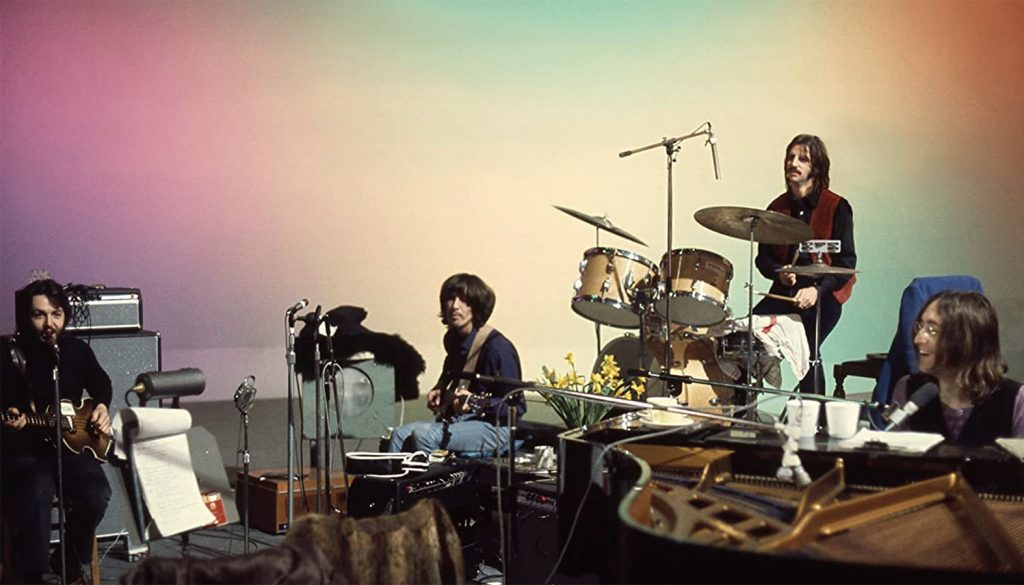When I wrote about the 50th anniversary of the Beatles’ Abbey Road album and how it was able to dominate the charts a half-century after it was recorded, I thought I was done with the Beatles. With the Peter Jackson epic re-imagining of the “Let It Be” documentary, I discovered I was wrong. Leave it to “Lord of the Rings” maven Jackson to turn a 90-minute film released in 1970 into eight hours of 2021 content.
I must confess I binged my way through the entire documentary on the Disney streaming service and found that you could have trimmed a couple of hours off this behemoth and still captured the essence of what Jackson was conveying.
Like the Beatles themselves in this period of their careers, the film meanders and does not have a lot of focus, as hard as Paul McCartney tries to instill some. Normally, I wouldn’t watch a bunch of musicians fiddling around on their instruments, getting into petty squabbles, and doing a lot of just sitting around, but somehow when the Beatles do it, it’s compelling. What Jackson’s long form did that the original theatrical “Let It Be” film could not was give context to all those squabbles and sitting around.
All of the pre-release marketing hype about how Peter Jackson was going to show a happier group of band mates and not the sour and testy group we saw in the “Let It Be” film turned out not to be hype. From all these hours of film it was clear that they still had the ability to have fun together.
It was also clear they were coming apart at the seams. The life of living in a bubble was taking its toll, which did make for interesting viewing even if I felt like a voyeur at times.
It was painful to watch as each member takes a turn of silent reflection on that very real possibility — in between the squabbling and general nonsense of course.
Why and how the Beatles not only reached the zenith of the pop culture world, but continue to reign supreme, could give Peter Jackson an idea for another eight-hour documentary. Certainly, their parts may have not been greater than their collective whole, and they were not like any pop group of their time. The Rolling Stones fired original bandmates and replaced others with little fanfare, and they are still the Rolling Stones. Many other groups continue to go through personnel changes and the name remains the same.
Remove John, Paul, George, or Ringo, and you don’t have the Beatles.
As with music, timing is everything when it comes to popular culture, and this may be the key to the Beatles’ longevity and their imprint on our culture today that still resonates — for good, their music, and for bad, their leadership role in the secularization of our culture.
The de-Christianizing of Europe may have started in earnest in the wake of World War I carnage, and gained momentum as the aftermath of the Second World War that left Europe, as well as a good portion of Great Britain, in ashes; but the sexual revolution and revolt of youth and the largest block of young people in American history — baby boomers — were ripe for replacement figures to the ways of their parents.
For the Beatles, this almost ended before it began when John Lennon flippantly suggested that due to the media frenzy and modern communication, the Beatles were “bigger” than Jesus. With a lot of public relations damage control and expert back flipping, the Beatles recovered. Now, John Lennon’s ode to atheism and nihilism, the song “Imagine,” is used by Madison Avenue to sell things to the same Middle America that once burned Beatle records. And even with only two surviving members of the band, they remain standard bearers of now multiple generations that have rejected the “old fashioned” view of religion.
George Harrison, whose mother was Catholic, was the “mystic” one when he wasn’t being the “quiet” one. He did believe in a supernatural world, though the Hindu version of it. Lennon debunked all religions, McCartney seemed to play both sides against the middle, and Ringo, well, Ringo was the drummer.
We can all agree with the Beatles that “All You Need is Love,” but we differ in the definition. Love is not a peace sign and belief in some ambiguous positive energy. Love walked the Earth, and his sign was a cross.

